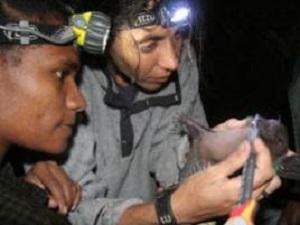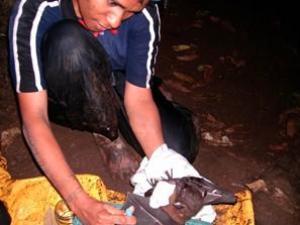Silvia Lomascolo
A monitoring program of Dobsonia moluccensis, a common but heavily hunted bat in the highlands of Papua New Guinea

We're looking at the bat's incisors because, if they're lacking, it might be the world's rarest bat, Aproteles bulmearae. The incisors were present.
My project's main goal is to start a monitoring program of Dobsonia moluccensis, a common but heavily hunted bat in the highlands of Papua New Guinea (PNG). I am training a female student, Kore Tau, from the University of Papua New Guinea, who will work on this bat for her honours thesis, and will eventually be in charge of the monitoring program. I'm working together with the Wildlife Conservation Society's PNG country program in this project.

Tissue Sample - Kore is using a punch to obtain tissue samples from the bat’s wing for future genetic analyses.
More than 90% of PNG's population lives in villages and eats almost exclusively the products of their gardens. Although some domestic animals are bred as a protein source, most people still hunt wildlife. Cave dwelling bats are very easy targets because they can be hunted by the hundreds at one cave. Their meat is greatly appreciated by the villagers, and we fear that hunting trips to caves will become more and more frequent as other wild animals, such as cuscus, wallabies, or tree kangaroos, become rarer. We will eventually enlarge our monitoring program to include another conspicuous and heavily hunted species in the lowlands, Pteropus conspicillatus, but for now we are working around a village called Herowana in the Eastern Highlands province. This is because we suspect that another, very rare bat, might share the caves with the more common Dobsonia moluccensis. Aproteles bulmerae is a highly endangered species that was thought to be extinct until 1993 when one population was rediscovered in Western Province, PNG. If it is still living in those caves, we're positive that we will find it.
This project also includes some work in the lowlands that focuses on the role of bats as seed dispersers of trees of the genus Ficus (Moraceae). This genus is found in almost all tropical forests in the world and are considered a very important resource for all animals, not just bats. This ties up to the main goal of my project as, by understanding the role of bats in the ecosystem we can develop stronger arguments to foster this conservation effort.